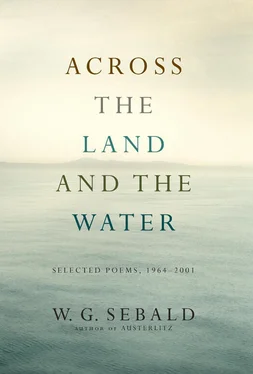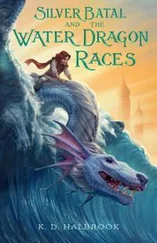55 Crossing the WaterÜLW. The poem, with the exception of the date, is almost identical to lines at the end of section 1 of “Dark Night Sallies Forth,” in After Nature , op. cit. (p. 85). In Michael Hamburger’s translation, the passage reads: “and a little later, / crossing to Floridsdorf / on the Bridge of Peace, / I nearly went out of my mind.” The German (in Nach der Natur ) is: “und wenig später hätte ich / bei einem Gang über / die Friedensbrücke fast / den Verstand verloren,” in Nach der Natur , Frankfurt am Main: 2004 (p. 75). Did Sebald ask Michael Hamburger to insert Floridsdorf? Interestingly, various bridges do cross the Donau to Floridsdorf, but the Friedensbrücke (Bridge of Peace), which crosses the Donau-Kanal more or less from the Franz-Josefs-Bahnhof in Alsergrund to Brigittenau, is not one of them.
56 Natural HistorySL, ÜLW. Title: in English in the German text. Another of Sebald’s “found” poems, taken verbatim from Johann Wilhelm Ritter’s Fragmente aus dem Nachlaß eines jungen Physikers , Bd. 2, Heidelberg: 1810 (p. 61); see also note on “Trigonometry of the Spheres” below. Ritter explains the position of Man in relation to the other “quarters” of the world: birds, worms, fishes, insects. Man is at the center of a cross formed by the intersection of lines joining these four regions of being. However ironic, Sebald’s use of the found material illustrates the continuity of his fascination with matters arcane, alchemical, and astrological.
57 BalladPT, SL, ÜLW, H. Title: “Ballad” refers less to the poetic genre of Sebald’s poem than to the preferred form of its subject’s compositions. Carl Löwe , or Carl Loewe, is known to have set several hundred ballads to music. The poem is an exercise in negotiating the Uncertainty Principle. It all seems simple — or even slight — at first, but the choice of words, the order in which they appear and the question form itself allow for a baffling range of variables. Is Carl Löwe’s (or Loewe’s) heart (or is it in fact his liver, or tongue, or indeed somebody else’s heart?) really immured (or has it been hung or buried?) in a column (or is it the pulpit?) of St. Jacob’s Church, or the Jacobus or Jacobi Church, or the Church of St. James, or the Cathedral Basilica of St. James the Apostle in Stettin, or, more politically correct, in Szczecin? Well, is it? Go and see (if you can see through stone, that is). If you can’t find the heart where the poem suggests it is, you might try searching for a recess in the great C-pipe of the organ. Loewe was the church organist at St. James’s for forty-six years.
58 Obscure PassageSL, ÜLW, H. did not apprehend … the word: readers who — as I have attempted to do and failed — wish to identify the source of misunderstanding or incomprehension the poem refers to may find it useful to know that “Wort”—here translated as word —can also mean “dictum” or “expression.” It need not therefore be merely a single word we are looking for. Perhaps understanding itself is the key. In German verstehen not only stands for the cognitive process but may denote the physical act of comprehension, symbolically and actually located, at least partly, in the faculty of hearing. Archytas of Tarentum, who was active in the third century BCE, was one of the first and most influential classical proponents of a theory of the limitations of hearing. Archytas maintained, for example, that harmony might be developed far beyond our limited physical apprehension of sound, and that its ultimate understanding could not therefore be attained via our senses, “for the great sounds do not steal into our hearing, just as nothing is poured into narrow-mouthed vessels, whenever someone pours a lot.” See Carl A. Huffman, Archytas of Tarentum , Cambridge: 2005 (p. 107).
59 Poetry for an AlbumÜLW, H. The first stanza appears in different versions in Sebald’s volumes For Years Now , London: 2001 (p. 48) and Unrecounted , op. cit. (p. 23). It consists largely of a quotation from Jean Paul’s novel Flegeljahre ( Uncouth Youth ) ( Jean Pauls Sämtliche Werke , 26, Berlin: 1827 [p. 61]): “Gefühle, sagt’ er, sind Sterne, die bloß bei hellem Himmel leiten, aber die Vernunft ist eine Magnetnadel, die das Schiff noch ferner führt, wenn jene auch verborgen sind und nicht mehr leuchten.” (“Feelings, he said, are stars which guide us only when the sky is clear; but reason is the needle that carries on guiding the ship even when the former are hidden and no longer shine out.”) palsied: Schumann suffered from digital paralysis. A revised version of the fourth stanza appears in After Nature , op. cit., p. 91. Carnaval (with this spelling) is a piano work (op. 9) by Schumann. For Ormuzd and Ariman , see note on “Mithraic” above. The conventional spelling is Ahriman. whistling sound: a slightly different version of these lines is found in For Years Now , op. cit. (p. 75).
60 Eerie Effects of the Hell Valley Wind on My NervesÜLW, H. Title: the Höllentäler, translated here as Hell Valley Wind , is an evening wind in Freiburg (where Sebald studied), blowing from east to west through the Höllental and Dreisam Valley. In a different context, perhaps, the word Höllental need not have been translated, but the poem requires the reader’s alertness to a notion of human hell — the world of Daniel Paul Schreber . Schreber was a presiding judge in Dresden who was admitted to an asylum at the height of his career and believed God was turning him into a woman. Freud wrote on his case, as did C. G. Jung, Elias Canetti, Gilles Deleuze, and Jacques Lacan. Schreber wrote accounts ( Memoirs of My Nervous Illness ) of his various periods of treatment in asylums. In one, it is clear that some of his oppressors and the malevolent changes they made in the world were linked to Cassiopeia . The phrase Order of the World is a quotation from Daniel Paul Schreber’s memoirs. li più reconditi principii della naturale filosofia (the most secret principles of natural philosophy): from Prodomo (1670) by Francesco Lana de Terzi (1631–87), a Jesuit who proposed the idea of a vacuum airship and invented an early form of Braille. In his memoirs, Schreber describes himself as a stony guest who has returned from the distant past to a world grown unfamiliar. Open … into hell: English in the original text.
61 Unidentified Flying ObjectsÜLW. Title: in English in the German text. lake of Idwal: Llyn Idwal, a small lake overshadowed by the Glyders at the head of Ogwen Valley in Snowdonia. According to legend, the Welsh prince Idwal, a son of Owain Gwynedd, was murdered there.
62 The Sky at NightÜLW. Title: in English in the German text.
63 A Peaceable KingdomÜLW. Title: in English in the German text. A number of works by the Quaker “naïve” artist Edward Hicks (1780–1849) were known as the Peaceable Kingdom paintings, and based on Isaiah 11:6: “The wolf also shall dwell with the lamb, and the leopard shall lie down with the kid; and the calf and the young lion and the fatling together; and a little child shall lead them.” The paintings are reminiscent of the Paradise Landscape works of Jan Brueghel; see note below on the final poem of “The Year Before Last” section, “In the Paradise Landscape.” Parts of the text derive from the abecedarian “Shaker Manifesto” of 1882, republished as a preschool text in 1981 under the title A Peaceable Kingdom: The Shaker Abecedarius , illustrated by Alice and Martin Provensen. Crocodile … bear: original text in English. Are these … our love: original text in English.
Читать дальше












